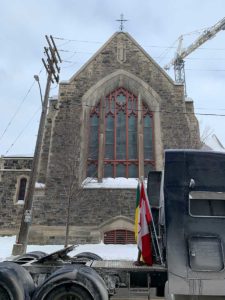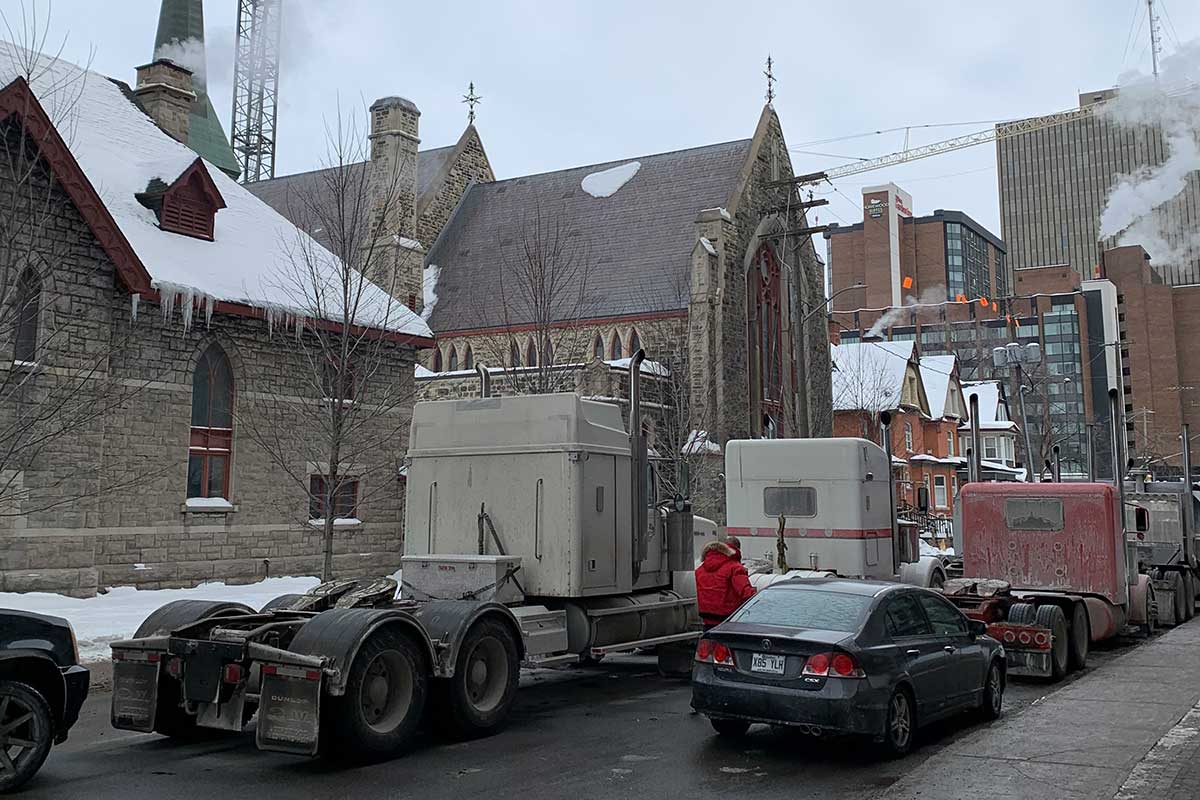Pandemic weary residents of Ottawa faced a new assault on their senses and sensibilities as protesters jammed the downtown core with massive trucks emblazoned with many angry and hateful messages and horns blaring day and night.
The protesters, whose demands included lifting all pandemic-related restrictions and mandates, gravitated toward Parliament, but their presence and tactics affected everyone in the downtown area.
Bishop Shane Parker had a close view of the situation with trucks filling the streets around the diocesan offices in Ascension House and Christ Church Cathedral. He issued a statement on Feb. 2 describing the situation and some of the challenges to resolving it.
“A hard core of local, national and international groups of protesters continue to occupy the downtown core of Ottawa, exhibiting unlawful, aggressive, and hateful behaviours. There are multiple factions here: It is not one group with one leader,” he wrote.
“Residents and businesses continued to be troubled and harassed, particularly those who are in any way vulnerable, and especially those experiencing poverty and homelessness, and the frontline staff who support them. This is unjust and unacceptable.”
Cornerstone Housing for Women also issued a statement about the protests’ impact on the women in its emergency shelter, located very close to the protests.
“Women and staff are scared to go outside of the shelter, especially women of color. Being able to go outside is the only reprieve many women experiencing homelessness have, and they cannot even do that. The incessant honking and noise from the trucks have caused significant anxiety and distress for staff and shelter residents. Women have admitted themselves into hospital due to the increased trauma from the noise and fear.

After the past two years of battling through this unprecedented global pandemic, the toxic opioid epidemic, everyone is completely exhausted and cannot take one more day of this protest’s added stresses.”
Sarah Davis, executive director for Cornerstone, spoke with Crosstalk and described the experience of a woman who came to the shelter for her first shift as a cleaner during the first weekend of the protest. After work, the woman waited outside for a bus for 40 minutes, but it never arrived because of the blockade. “She ran back to the shelter and was so distraught that we couldn’t actually make out the words she was saying at first,” Davis said. “She is a racialized immigrant woman. English is not her first language. She was feeling very scared for her safety. We ordered her an Uber, we escorted her to that Uber and paid all of the additional surcharges of that Uber coming to pick her up, which is absolutely worth it, but not something that’s in our budget.”
The statement from Cornerstone also pointed out that “the cost of this protest to our city for three days would fund our women’s emergency shelter for more than an entire year, and yet this protest has cost us financial hardship. Frontline staff and healthcare workers have come to work every day for nearly two years, managing through this pandemic to provide safe, supportive services and communities to people in Ottawa who have no place to call home, and now they’re having heightened fear and anxiety around coming into work over these past few days in the midst of a global pandemic. Our shelter system cannot take one more day of the consistent noise and fear.”
Rachel Robinson, executive director of the Ottawa day programs — Centre 454, St. Luke’s Table and The Well— said the programs were were impacted by the challenges the protests created for people getting to work. “Some are parking outside the core and walking 30 minutes to get to Centre 454. We pre-emptively closed Centere 454 on the first weekend because we were concerned about staff getting there,” she said, adding that the protests have disrupted the lives of staff and many participants who live in Centretown.
The Rev. Steven Zytveld, who lives in the neighbourhood of Christ Church Cathedral, spoke to Crosstalk four days into the protest that he and his wife had been unable to sleep because of the noise.
All Saints Westboro posted a list of supports for downtown residents, including a group that offered safe walks, rides and grocery delivery, as well as contacts for the Ottawa Distress Line, counselling support and victim services.
Bishop Parker ended his statement by asking people to pray for “those whose decisions will lead to a resolution of this alarming occupation” and to pray for “peace in the nation’s capital.”


Saint Mary’s Church, Westmeath — Deanery of the Northwest